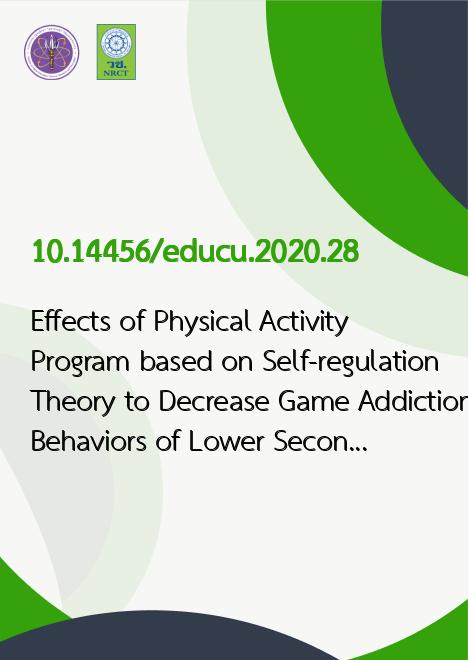
|
Effects of Physical Activity Program based on Self-regulation Theory to Decrease Game Addiction Behaviors of Lower Secondary School Students |
|---|---|
| รหัสดีโอไอ | |
| Creator | Pawee Muangchuen |
| Title | Effects of Physical Activity Program based on Self-regulation Theory to Decrease Game Addiction Behaviors of Lower Secondary School Students |
| Contributor | Jintana Sarayuthpitak |
| Publisher | Centre for Education Innovation, Print and Online Media |
| Publication Year | 2563 |
| Journal Title | Journal of Education Studies, Chulalongkorn University |
| Journal Vol. | 48 |
| Journal No. | 3 |
| Page no. | 184-196 |
| Keyword | physical activity program, self-regulation theory, game addiction behavior, lower secondary school students |
| URL Website | https://so02.tci-thaijo.org/index.php/EDUCU |
| Website title | Journal of Education Studies, Chulalongkorn University |
| ISSN | 2651-2017 (Online) |
| Abstract | This study aimed to compare the means of game addiction scores before and after the experiment conducted on the experimental group and the control group, 2) the means of game addiction scores of the experimental group and the control group after the experiment, and 3) the means of game addiction scores from parents of the experimental group participants before and after the experiment. The participants included 50 students in grades 8-9 from Wattanothaipayap School, Chiang Mai Province. 25 of the students were assigned to the experimental group, while the remaining 25 formed the control group. The experiment lasted for six weeks in total. The research instruments included a game addiction evaluation form and the Physical Activity Program based on Self-Regulation Theory, which is designed to decrease game addiction among lower secondary school students. The data was analysed using mean, standard deviation, and t-test.The results indicate that the mean of the game addiction scores of the experimental group after the experiment was significantly lower than before the experiment (p < 0.05), while the mean score of the control group after the experiment was not significantly different from before the experiment (p < 0.05). After the experiment, the mean of game addiction scores among the experimental group was found to be significantly lower compared to the control group (p < 0.05). Similarly, the mean of game addiction scores from parents of the participants in the experimental group decreased significantly after the experiment (p < 0.05). |